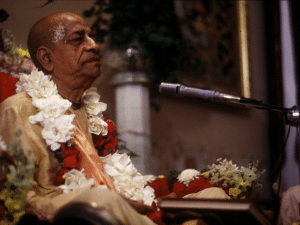One should always remain as a servant
Satsvarupa Dasa Goswami: We should see the superiority of a devotee (with no question of whether he is a grhastha or a sannyasi) based on whether one is serving. How one is advanced in Krishna consciousness. This principle. If we follow the standard of dress, we cannot understand who is advanced. It is by his advancement in Krishna consciousness (that we can judge). If we make sannyasa and grhastha parties, then we'll have party politics. Now you consider this. I see the tendency of parties. That should be stopped immediately. I want dissatisfaction to go away.
Presidents: They must be sincere.
Prabhupada: If we become different parties, it will be spoiled. Why this tendency that sannyasis ask men to come join them for spiritual advancement and give up living in the temples? There should be cooperation of manpower both ways from presidents to sannyasis and vice versa. Why this propaganda? Real attachment is not to belong to a sannyasi or brahmacari group. This is material. Real spiritual identity is I belong to Krishna, I have to work for Him and guru. A devotee is above the other attachments. This is essential. It is superficial, the distinction between brahmacari, sannyasi, grhastha. We say prabhu to everyone. I say prabhu, you say prabhu, master. Living in the temple is also preaching, it is purifying, cleansing. Deity worship, sri vigraha.
Ramesvara: A brahmacari in the temple is following you, the greatest sannyasi. That is preaching.
Prabhupada: Yes. Gurukrpa: But why should he have to stay against his will? They force him.
Prabhupada: In different circumstances there is different behavior. There cannot be any fixed up situation for everyone. Brahmacaris can go with sannyasis, but not a responsible man. Now there is a party feeling: you say don't go, they say to go. Why this party feeling? You vote for me, another party votes for me. But the temple is as good. If the sannyasis need more men, why don't they recruit men from outside? It is etiquette that if you take men from the temple, you have to ask the permission of the president. The Six Gosvamis were worshiping in the temples. Their descendants were not seminal, by birth.
Generally the management of the temple is given to grhasthas. It is by the example of the Six Gosvamis. The facility of management is given to grhasthas. It is better they manage the temples and the sannyasis preach, and brahmacaris either stay in the temple or preach with the sannyasis. The problem is that we are forgetting we are the servant of Krishna. He is in this department or that department, why strife of party? The basic quality is Krishna consciousness. It is not hard and fast that only grhasthas can manage. Either sannyasi or grhastha, it doesn't matter. Not that a grhastha can't preach or a sannyasi can't manage a temple, but generally if a sannyasi is free of all botheration, his preaching is very nice. Everything is common sense. There is no distinction between grhastha or sannyasi. One should take the post suitable for him. This discussion has no meaning. Bhaktivinoda Thakura was a grhastha, but that does not mean Bhaktisiddhanta Sarasvati was better than he; one was guru and the other was guru. See how he is serving, how he is eager to serve Krishna, how he is looking after Krishna's interest. We are a worldwide organization. If there is such threatening, unusual competition, puffed-up prestige, it is not good. One should always remain as a servant.
